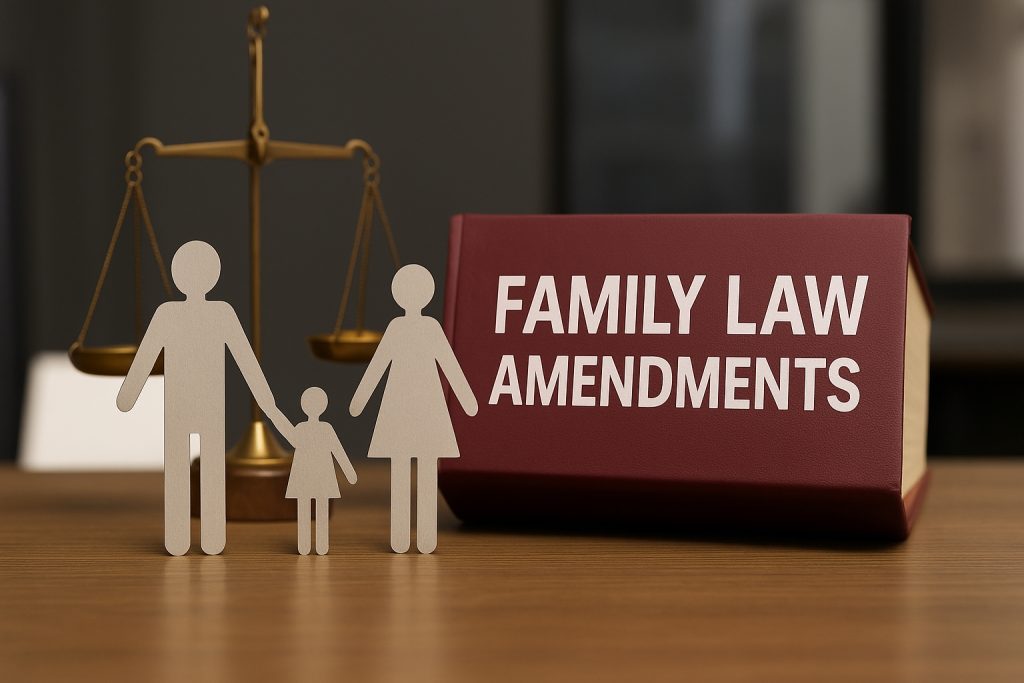Amendments to the Family Law Act affecting Parenting Orders
The amendments to the Family Law Act in Australia in 2024 and 2025 introduced significant changes to both parenting and property matters. These amendments simplify how the courts assess what is best for children and manage property division for separating couples.
The changes have been introduced in two main tranches:
- The 6 May 2024 changes mainly focused on parenting
- The 10 June 2025 changes mainly focused on property.
All the changes aim to simplify how the courts assess what is best for children, ensuring the safety of all parties, outlining a practical approach to help separating couples move on, manage the division of their property and consider a child-focused parenting moving forward.
Removing the Presumption of Equal Shared Parental Responsibility (ESPR)
Prior to May 2024, the Courts were required to assume that both parents should share parental responsibility equally except if there was evidence of abuse or family violence.
However, this had some unfortunate consequences. Parents became confused and thought that it meant that the children would spend equal time with each of the parties. In other cases, a coercive controlling partner could use the joint discussions about school or health arrangements to force contact in unsafe situations.
Also, there were 16 considerations which had to be taken into account often resulting in a convoluted pathway of documenting minutiae in a tit-for-tat criticism of each party’s parenting capacity.
To learn more about equal shared parental responsibility changes, see our recent article here.
Amendments to the Family Law Act (FLA) Since May 2024
Without the presumption of shared parental responsibility, the Courts consider what is best for the children in the particular circumstances of the case.
Wherever it is safe and practical to do so, parents are encouraged to consult with each other and share parental responsibility. However, this will always be viewed in what will promote the well-being of the children and ensure that they are not subjected to violence in any form whether physical or emotional.
2024 Amendments to promote Child-focused Parenting
This change is in line with the Court’s intention of making the process of post-separation parenting, less confrontational and adaptive rather than wasting time in completing lengthy documents and taking up Court time, arguing about how to make everything equal.
If one parent has responsibility for the child or children on a particular weekend then that parent can deal with any emergency such as a sports accident and see to the safety of the child without having to first consult the other parent. The situation will be communicated appropriately as soon as possible but the well-being of the child will be paramount.
The Role of the ICL
The Independent Children’s Lawyer (ICL) fulfills an important role in parenting proceedings. The amendments to the Family Law Act reflect the responsibilities that the ICL takes on in representing children in the Family Court.
ICLs are appointed in the most difficult cases when the Court makes an order to appoint an ICL to represent the children and promote what is best for them in the situation of the case.
2024 FLA Amendments to “Hear” the Child
The amendments now mandate that the ICL must meet directly with the children except in some limited circumstances.
This ensures that the children’s voice can be heard so that their views can be better addressed and understood in Court when considering parenting orders.
Children’s Contact Services
The amendments to the Act also provide a regulatory framework for Children’s Contact Services (CCS) again, to ensure the safety and wellbeing of children.
2024 Family Law Act Amendments to Keep Children Safe
A significant amendments is the introduction of accreditation requirements for all CCS practitioners as well as provisions legislating the disclosure of safety information. There are mandated penalties for non-compliance. The Courts can only refer families to accredited CCS practitioners and related businesses.
Final Parenting Orders
The Amendments have also legislated what was known as a Rice and Asplund application. These applications were made when a party sought to vary the final parenting orders. The case provided guidance on when the Courts would consider varying final orders which would only be consider if there had been a significant change in circumstances since the final orders were made.
There is now a clearly legislated pathway for consideration of such an application.
Companion Animals
Pets have always been considered property. Now the role of pets as companion animals within the family and particularly in relation to the children, is taken into account as well as any violence against the pet or that the child may have witnessed.
The unique role of companion animals is reflected in the balance between the property and parenting orders when deciding where they will live.
The Way Ahead
We understand that legal proceedings may be daunting without having to consider recent Australian Family Law Act 2024 and 2025 changes. It must at times seem overwhelming.
However, this is what we do. We do understand how stressful separation can be, how difficult managing time with children and how trying to decide on workable parenting arrangements can be a real challenge.
Whether you are seeking to sort our parenting arrangements or how to manage your financial situation, we are here to help.
Please contact us and we can go through each step to see what works best for you, talk through things and sort out any questions or worries you might have.
This article is for information purposes only and should not be relied on for legal advice.

